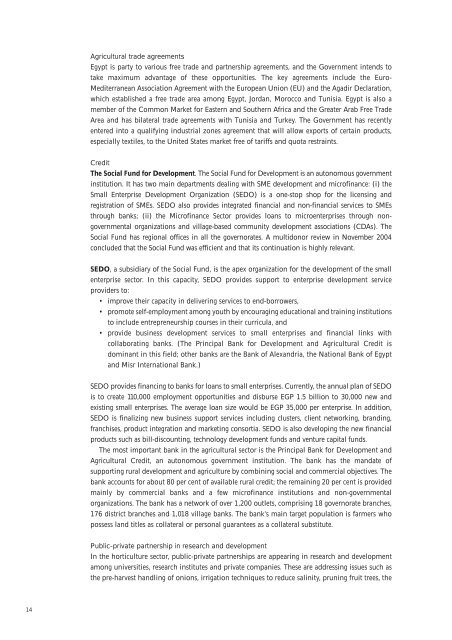Egypt: Smallholder contract farming for high-value and ... - IFAD
Egypt: Smallholder contract farming for high-value and ... - IFAD
Egypt: Smallholder contract farming for high-value and ... - IFAD
You also want an ePaper? Increase the reach of your titles
YUMPU automatically turns print PDFs into web optimized ePapers that Google loves.
Agricultural trade agreements<br />
<strong>Egypt</strong> is party to various free trade <strong>and</strong> partnership agreements, <strong>and</strong> the Government intends to<br />
take maximum advantage of these opportunities. The key agreements include the Euro-<br />
Mediterranean Association Agreement with the European Union (EU) <strong>and</strong> the Agadir Declaration,<br />
which established a free trade area among <strong>Egypt</strong>, Jordan, Morocco <strong>and</strong> Tunisia. <strong>Egypt</strong> is also a<br />
member of the Common Market <strong>for</strong> Eastern <strong>and</strong> Southern Africa <strong>and</strong> the Greater Arab Free Trade<br />
Area <strong>and</strong> has bilateral trade agreements with Tunisia <strong>and</strong> Turkey. The Government has recently<br />
entered into a qualifying industrial zones agreement that will allow exports of certain products,<br />
especially textiles, to the United States market free of tariffs <strong>and</strong> quota restraints.<br />
Credit<br />
The Social Fund <strong>for</strong> Development. The Social Fund <strong>for</strong> Development is an autonomous government<br />
institution. It has two main departments dealing with SME development <strong>and</strong> microfinance: (i) the<br />
Small Enterprise Development Organization (SEDO) is a one-stop shop <strong>for</strong> the licensing <strong>and</strong><br />
registration of SMEs. SEDO also provides integrated financial <strong>and</strong> non-financial services to SMEs<br />
through banks; (ii) the Microfinance Sector provides loans to microenterprises through nongovernmental<br />
organizations <strong>and</strong> village-based community development associations (CDAs). The<br />
Social Fund has regional offices in all the governorates. A multidonor review in November 2004<br />
concluded that the Social Fund was efficient <strong>and</strong> that its continuation is <strong>high</strong>ly relevant.<br />
SEDO, a subsidiary of the Social Fund, is the apex organization <strong>for</strong> the development of the small<br />
enterprise sector. In this capacity, SEDO provides support to enterprise development service<br />
providers to:<br />
• improve their capacity in delivering services to end-borrowers,<br />
• promote self-employment among youth by encouraging educational <strong>and</strong> training institutions<br />
to include entrepreneurship courses in their curricula, <strong>and</strong><br />
• provide business development services to small enterprises <strong>and</strong> financial links with<br />
collaborating banks. (The Principal Bank <strong>for</strong> Development <strong>and</strong> Agricultural Credit is<br />
dominant in this field; other banks are the Bank of Alex<strong>and</strong>ria, the National Bank of <strong>Egypt</strong><br />
<strong>and</strong> Misr International Bank.)<br />
SEDO provides financing to banks <strong>for</strong> loans to small enterprises. Currently, the annual plan of SEDO<br />
is to create 110,000 employment opportunities <strong>and</strong> disburse EGP 1.5 billion to 30,000 new <strong>and</strong><br />
existing small enterprises. The average loan size would be EGP 35,000 per enterprise. In addition,<br />
SEDO is finalizing new business support services including clusters, client networking, br<strong>and</strong>ing,<br />
franchises, product integration <strong>and</strong> marketing consortia. SEDO is also developing the new financial<br />
products such as bill-discounting, technology development funds <strong>and</strong> venture capital funds.<br />
The most important bank in the agricultural sector is the Principal Bank <strong>for</strong> Development <strong>and</strong><br />
Agricultural Credit, an autonomous government institution. The bank has the m<strong>and</strong>ate of<br />
supporting rural development <strong>and</strong> agriculture by combining social <strong>and</strong> commercial objectives. The<br />
bank accounts <strong>for</strong> about 80 per cent of available rural credit; the remaining 20 per cent is provided<br />
mainly by commercial banks <strong>and</strong> a few microfinance institutions <strong>and</strong> non-governmental<br />
organizations. The bank has a network of over 1,200 outlets, comprising 18 governorate branches,<br />
176 district branches <strong>and</strong> 1,018 village banks. The bank’s main target population is farmers who<br />
possess l<strong>and</strong> titles as collateral or personal guarantees as a collateral substitute.<br />
Public-private partnership in research <strong>and</strong> development<br />
In the horticulture sector, public-private partnerships are appearing in research <strong>and</strong> development<br />
among universities, research institutes <strong>and</strong> private companies. These are addressing issues such as<br />
the pre-harvest h<strong>and</strong>ling of onions, irrigation techniques to reduce salinity, pruning fruit trees, the<br />
14

















